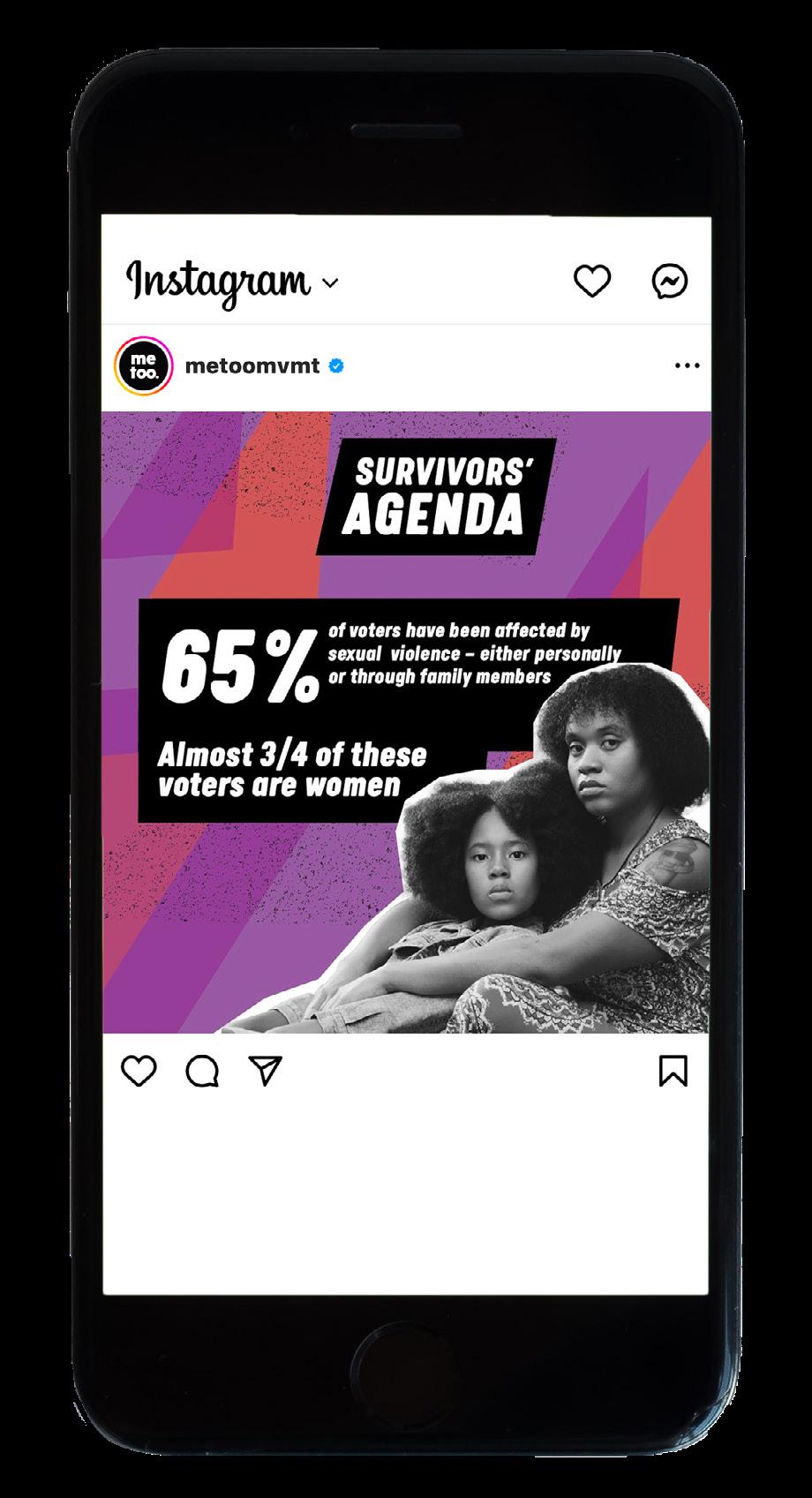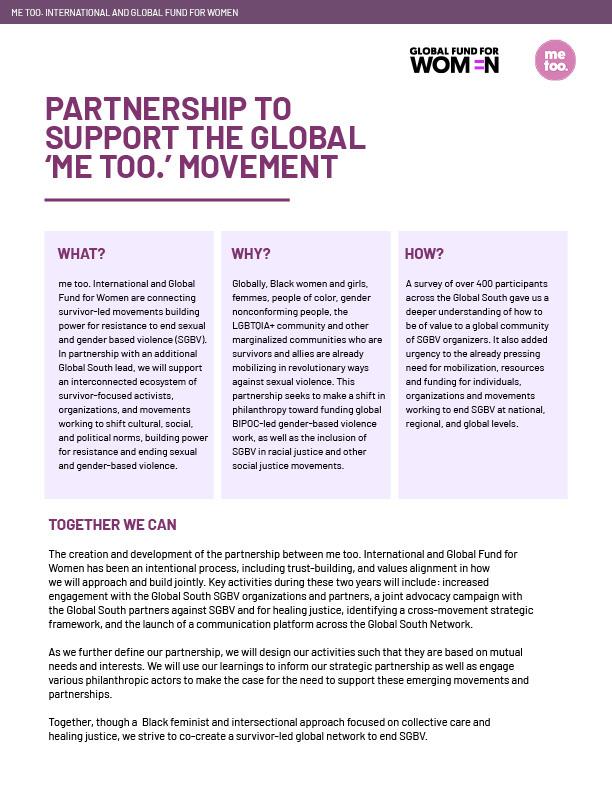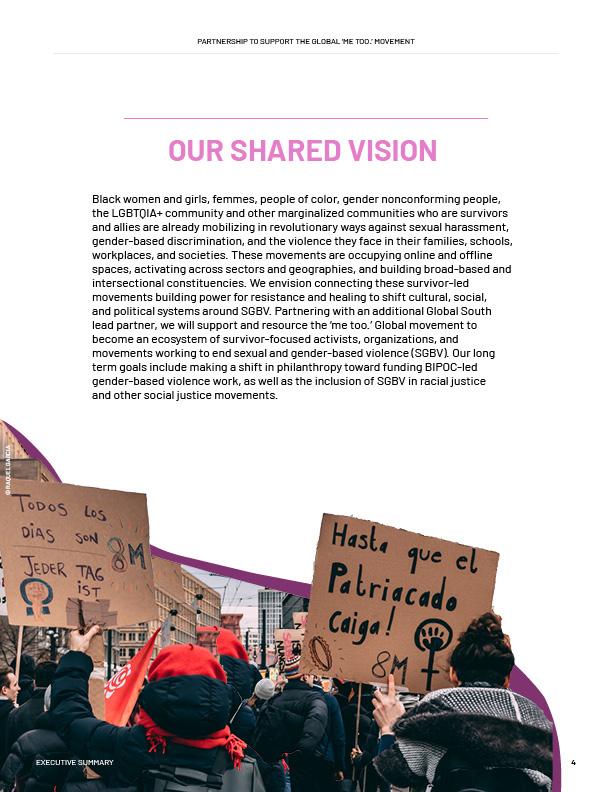
2 minute read
THE INTERSECTION OF HEALING AND ACTION

‘me too.’ and its communities do not only exist in the aftermath of sexual violence. We exist as proactive community support. We exist to innovate and intervene. We exist as a convener to harness the power of survivor leaders seeking to make critical shifts in the political and material conditions of survivors every day.
Advertisement

Narrative Power Building
Survivors have long been subject to narratives that promote further harm and shame. Creating shifts in these narratives that form our understanding of sexual violence is essential to creating progress that enables the healing of survivors, the safety of our communities, and the eventual eradication of sexual violence in our world.

2022 saw a year of continued hyper-awareness of #MeToo, and yet, the understanding of the needs of survivors and the goals of the movement to end sexual violence was often mischaracterized and even villainized. From celebrity cases to the mass attacks on Black and Brown folks, trans children and adults, and overall body autonomy, this year highlighted the expansive work still needed within our local and global communities.
Yet, we stood steadfast in our commitment to address these issues head-on by reminding the world that survivors possess agency and power and deserve to have their voices, needs, and visions at the center of the issues impacting them. Most importantly, we joined our community of survivors and allies to illustrate the multifaceted intersections of survivor identity, understanding that when we work towards survivor justice and survivor healing, we are working toward wellness, racial equity, disability justice, queer and trans liberation, legal justice reform, and much more.
Reproductive Justice is Survivor Justice



As reproductive rights fell onto the legislative chopping block, survivors were routinely excluded from the conversation − except when used as political pawns and exemptions. We re-centered survivors in this national conversation and reminded the world of the intersections of body autonomy and reproductive care. Ultimately, in collaboration with Survivors’ Agenda and a host of other community partners, we made it clear that reproductive justice is survivor justice.
Survivors’ Agenda
Survivor’s Agenda is a collective of survivor-centered organizations working to highlight survivors as a key political demographic that is well-informed and well-equipped to change policy, advocate and organize. In the spirit of survivor leadership, political education, and collective power, Survivors’ Agenda worked to gather and release insightful data that demonstrates the political demands and priorities of survivor voters as we approached the 2022 midterm elections. We produced a messaging guide and toolkit that reaffirmed our right to take up electoral space and hold our elected political officials accountable.
me too. International and Global Fund for Women have joined forces to develop and advance a shared vision to strengthen a global, interconnected, and intersectional movement to end sexual and gender-based violence (SGBV). This partnership is an opportunity for us to leverage our unique learnings, experiences, and localized relationships so that we can advance an overarching goal: to facilitate a well-resourced global ecosystem that works to end SGBV, and make healing and actionable support systems available to survivors.


Global Network
In August, we hired Nair Castillo as the Global Consultant for the Global ‘me too.’ initiative, anchored by me too. International and Global Fund for Women. This work has been evolving over the last couple of years and has required several iterations in response to the global pandemic. We are committed to a participatory and inclusionary global network-building process, grounded in listening to the needs of our global partners and remaining flexible to respond to rapidly changing environments. Nair comes to this work as the former Director of Planning, Transparency and Management for the Ministry of Women, Gender and Diversity in Buenos Aires. Under her leadership, we shared the key findings of our 2020 global survey in six languages with over 500 of our global partners. We are thrilled to be working with her during the coming year in building our global network.








